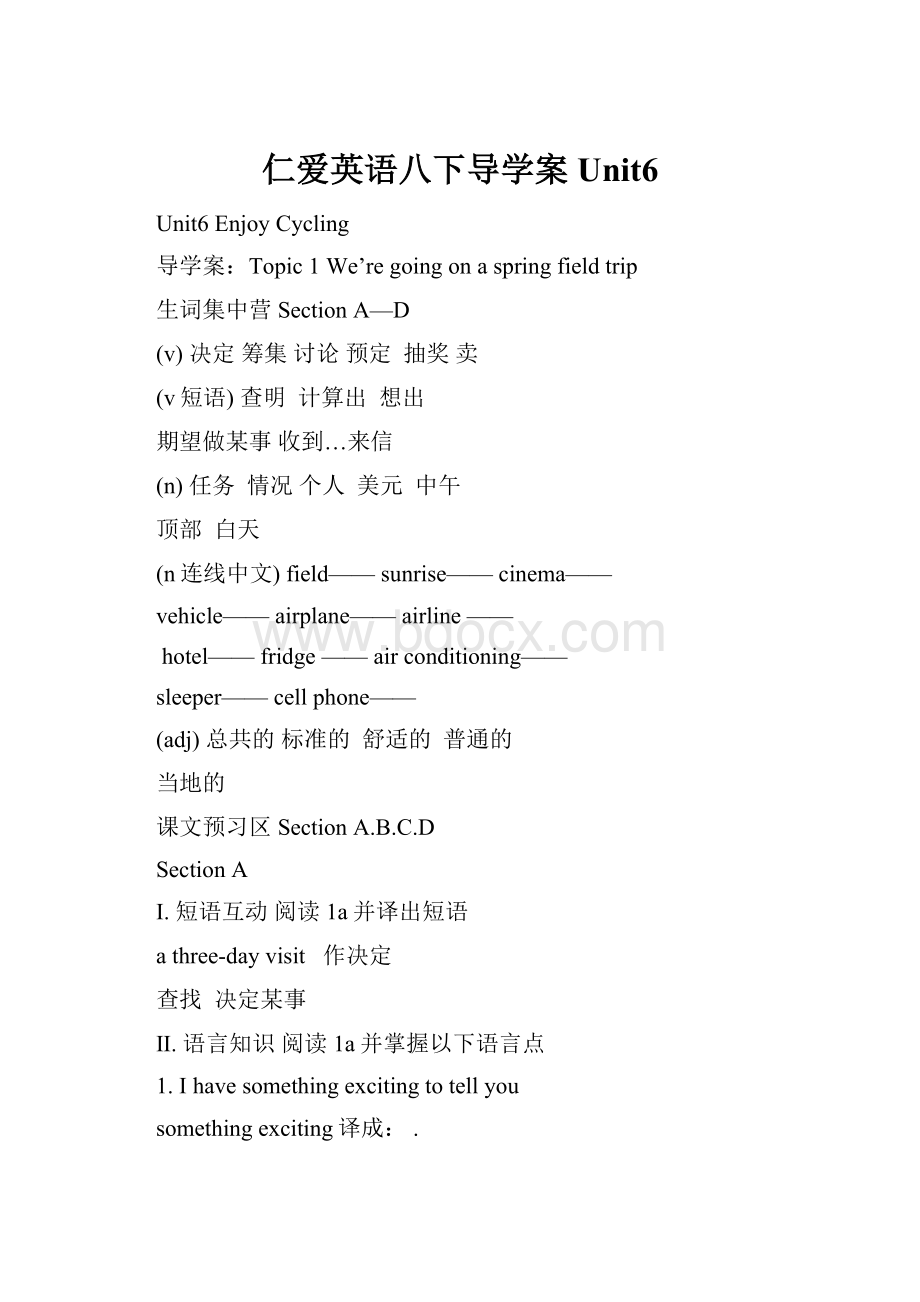仁爱英语八下导学案Unit6Word文档格式.docx
《仁爱英语八下导学案Unit6Word文档格式.docx》由会员分享,可在线阅读,更多相关《仁爱英语八下导学案Unit6Word文档格式.docx(16页珍藏版)》请在冰豆网上搜索。

take在此句中译成:
.其句型是Ittakessb+时间todosth.
.(我们将会花两天的时间坐火车到北京)
.(我昨晚花两个小时看完这部电影京)
4.It’stoofartocycle.
too…to…译成:
.特别是to译成:
.(这个箱子太重了搬不动。
)
5.We’lldecideonthebestwaytogoonourfieldtrip.
decideon译成:
.“决定做某事”译成:
decide的名词是:
Wemustthinkovercarefullybeforewemakeanimportant(决定).
I(决定)tomakepeacewithhim.
Ⅲ.课文解析
1.找出课文含有动词不定式的句子(列其中5句)
a.
b.
c.
d.
e.
2.完成Pairwork3
Ⅳ.语法讲解
动词不定式
1)作表语,常用在系动词之后.(用来解释说明主语)
Yourgroup’staskistofindoutthecosttogobytrain.
你小组的任务是去弄清搭火车的费用。
2)作主语,常用it(形式主语)代替,不定式放在后面做真正主语.
常用句型:
Itisadjforsbtodosth.
ItisimportanttolearnEnglishwell.学好英语非常重要。
4)
作宾语,常用在want;
refuse;
hope;
begin;
try;
forget;
learn;
plan;
decide;
need等及物动词后,构成动宾结构。
Iwanttobuysomebooks.我想去买一些书。
Wehopetobeteachers.我们希望成为教师。
Don’tforgettocallme.别忘了打电话给我。
5)
作宾补,invite,ask,tell,teach,encourage,get…sbtodosth
MrLinalwaysencouragesustostudyhard.
Pleasetellhimtocomehereearliertomorrowmorning.
6)
作定语,常用在被修饰的名词/代词之后。
Ihavesomeexcitingnewstotellyou.我有一些令人激动的消息告诉你。
Iwantsomethingtodrink.我想要些喝的东西。
7)
作目的状语,修饰谓语动词,表行为的目的。
。
Weshouldputashowtoraisemoney.
Wehadbetteropenthewindowsoftentokeeptheroomfresh.
练习:
用所给动词的适当形式填空
1.Wedecide(visit)museumthisafternoon.
2.Pleaseaskyourfather(give)upsmoking.
3.Itwilltakeustwohours(finish)thework.
4.Runningisagoodway(keep)healthy.
5.Mydreamjobis(be)adoctor.
SectionB
Ⅰ.短语互动阅读1a并找出短语
到达硬卧软卧
付钱
1.I’dliketobooksometicketstoMountTaionMarch13th.
Wehaveticketsat¥145forthehardsleeperand¥224forthesoftsleeper.
去…的票;
…价位的一张票;
一张硬卧的票.
1.阅读1a,2并找出以下句子的英文表达
a.我可以帮助你吗?
/我可以为你做什么?
b.我们有硬卧和软卧,你想要哪个?
c.你想要多少间标准房?
d.我可以有你的名字和电话号码吗?
SectionC
Ⅰ.短语互动阅读2a并找出短语
筹钱想出在中午
Ⅱ.语言知识阅读2a并掌握以下语言点
1.It’sverycommontoraisemoneyinCanadianandAmericanschools.
2.Students,teachersandparentshavemanyspecialwaystoraisemoneyforfieldtrip.
3.Itcostseachstudentonedollartobuyaticketforthedraw.
4.Thestudentsitsintheheadmaster’schairforthedayandevencanusetheheadmaster’scellphonetocallhome.
第1句中toraise在句中的成分是;
第2句中toraise在句中的成分是;
第3句中tobuy在句中的成分是;
第4句中tocall在句中的成分是.
1.完成Workalone5
SectionD
Ⅰ.短语互动阅读Writtenwork2并找出短语
一…就…看日出云海
在白天吃大餐名胜古迹
Ⅱ.语言知识阅读Writtenwork2并掌握以下语言点
1.IhaveawonderfultimeonMountTai.
haveawonderfultime译成:
.其同义词有/
We(玩得愉快)athispartylastnight.
2.Assoonaswearrivedthere,webegantoclimbMount.
assoonas译成:
.assoonas引导的是从句,遵循主将从现的原则。
我一到上海,我就会给你打电话。
.
1.翻译Writtenwork2文章.
第一段:
第二段:
Topic2HowaboutexploringtheMingTombs.
生词集中营SectionA—D
(v)收到考察做标记推踩
注意打败意识到发电子邮件
(n)明信片对话记号开端北方
东方观光空间人群方向
脚步卫兵
(adj)完美的官方的东方的巨大的
(adv)慢慢地伤心地
(短语)看不见忍不住
(连线中文)camping——northeast——
hiking——southeast——
backpack——southwest——
northwest——
与…讲电话为…做准备度假
为什么不期望做某事
1.Gladtoreceiveyourpostcard.
此句省略了主语Iam.be+adj+todosth译成:
很…做某事
如:
Iamsurprisedtomeetyouhere.我很惊讶能在这里遇见你。
(我很乐意与你交朋友).
2.Iamlookingforwardtomeetinghim.
“期望做某事”译成:
.后面的动词一定要用形式.
类似用法的短语有payattentionto,stickto…
Pleasepayattentionto(save)everydropofwater.
Ilookforwardto(learn)Englishfromyou.
3.WhynotexploreBeijingonourbicycles?
HowaboutexploringtheMingTombs?
Whynot后面所跟的动词要用形式;
Howabout后面所跟的动词要用形式.
Howabout(ride)ourbikestothepark?
3.根据例句完成Workalone2
a.cook/play
b.run/swim
c.dance/sing
d.rain/arrive
e.ring/watch
f.knockat/write
时间状语从句:
1.
引导词:
when;
while;
as当……时候
when既可跟短暂性动词也可跟延续性动词
while跟延续性动词
as多用于口语,强调“同一时间”或“一前一后”
e,g:
Thestudentsweretalkingintheclassroomwhentheteachercamein.
=Whilethestudentsweretalkingintheclassroom,theteachercamein.
Motheralwayssingsasshecooksdinnerforus.
2.
时态:
a)
当主句为一般过去时时,从句常为过去的某种时态;
Whilethestudentsweretalkingintheclassroom,theteachercamein.
b)
当主句为一般将来时时,从句为一般现在时
Assoonasthebellrings,thestudentswillgointotheclassroom.
3.练习:
1.Iwasdoingmyhomeworkwhilemyfather(read)newspaper.
2.WhenIgothome,mymother(cook)inthekitchen.
3.AssoonasIfailtheexam,I(feel)sad.
SectionB
告诉某人关于某事在脚下覆盖
确信thebeginningof
onbothsidesofthewaybytheway
1.TheyareatthefootoftheTianshouMountains,inthenorthwestofBeijing.
方位介词:
in;
on;
to.
in表在范围内;
on表两处相接壤;
to表两处不接壤
FujianisinthesoutheastofChina.福建在中国的东南部.
JiangxiisonthewestofFujian.江西在福建的西面.
JapanistotheeastofChina.日本在中国的东边.
eg:
Fujianis(in/on/to)thewestofTaiwan..
Pintanis(in/on/to)theeastofFujian.
1.完成Workalone3a
twohoursandahalf到达挤满了
parktheirbikes对…感到惊奇拿出
thecrowdofpeople四面八方不见了
一…就…
1.Kang,MichaelandDarrenarrivedattheMingtombs.
①arrivedat译成:
;
arrivedat跟地点;
arrivedin跟
地点.
②arrivedat/in的同义词是和.
Wearrived(at/in)thePeopleParkbybikeyesterday.
2.Theparkinglotwasfullofbuses,cars,taxisandbicycles.
befullof译成:
.同义词是.
(在大城市每天公车里都挤满了人).
3.TheywalkedintothepassageintoDinglingandweresurprisedatthewonders.
weresurprisedat译成:
后面所跟动词用形式.
Weareallsurprisedat(see)solargeanimals.
4.Thecrowdofpeoplebecamelargerandlarger.
largerandlarger译成:
由此推断单音节或部分双音节形容词的“越来越…”英文表达结构是;
而多音节形容词的“越来越…”英文表达结构是.
Theweatherisgetting(越来越暖和)inspring.
Shebecomes(越来越漂亮)now.
5.Henoticedhisfriendswereoutofsight.
outofsight译成:
.反义词是.
Suddenlytherabbit(消失了)andIcouldn’ttookaphotoforit.
1.阅读课文1a并找出部分时间状语从句
a.引导词after
b.引导词as
c.引导词while
d.引导词when
e.引导词not…until..
f.引导词assoonas
2.完成Workalone1b
not…until
not…until“直到……才”主句的谓语动词常用短暂性动词。
e.g:
Iwon’tleavehereuntiltherainstops.
after在……之后;
before在……之前;
assoonas一……就……
IwenttosleepafterIfinishedmyhomework..
=IfinishedmyhomeworkbeforeIwenttosleep.
Assoonasthebellrings,thestudentswillgointotheclassroom.
2.练习:
用提示词造句
1.昨天在我们爬山之后,我们感到既高兴又疲劳。
(after)
2.小孩子们一到动物园,他们就感到兴奋。
(assoonas)
早起在古代下来
代表对…叫玩得愉快
迷路向…求助最后
1.Whilewewerehavingfunexploring,IrealizedDarrenwaslost.
havefundoingsth.译成:
.如:
You’llfindyouhavefunlearningEnglish.你将会发现学习英语很有乐趣.
Icanhavefun(run)everyday.
1.完成Workalone1b
Topic3Bicyclesarepopular.
(n)乘客污染死亡警察
十字路口问题成功道路
结果亚洲
(n连线中文)hotline——helmet——fine——
motorcycle——cyclist——achievement——
challenge——comeback——superstar——
stage——champion——
(adj)疯狂的不可能的平坦的
中间的确定的最后的成功的
(adj连线中文)sharp——opposite——light-colored——
left-hand——broken——central——
(v)奔跑警告领导减速
继续做某事
Ⅰ.短语互动阅读1a,2a并译出短语
习惯害怕
obeythetrafficrulessaveenergy
听减速
ranintorushto
1.Theycanbringussadnessanddeath.
sadness和death都是词性,他们的形容词分别是和
。
Ioftenfeel(伤心)whenIfailtheexams.
His(死)makeusvery(伤心).
2.Toavoidhittingthetruck,theyoungmanranintothewallandhurthis
armbadly.
avoidhittingthetruck译成:
.由此可知avoid后面动词要用
形式.
Toavoid(hurt)ourselves,weshouldobeythetrafficrules.
1.阅读1a并完成下列的横线内容
Kangkang,MichaelandDarrenaretalkingabout____problems.Kangkangsawatraffic____yesterday.Andhethinksif____peopleobeytherules,therewillbe____accidents.DarrenthinksthetrafficinBeijingis____.Butsheisbraveenoughandshethinks____canhelpussaveenergy.Michaeldidn’tgetusedto____hisbikewhenhe____Beijingforthefirsttime.Sohe____withtorideabike.Becauseitis____toparkbikes.
2.完成Workalone2b.
AccidentReportForm
Time:
Date:
Place:
Accident:
事实上在晚上breakthetrafficrules
getafine在危险中
1.Ifwerideatnight,weshouldhavelightsonthebicycleorwearlight-coloredclothes.
此句意思是:
;
Ifwebreakthetrafficrules,wemaygetafineandevenbeindanger.
以上两句都是状语从句。
由作为引导词。
(如果我们在街道上开车),
weshoulddriveontherightofthestreet.
1.完成Workalone2
2.完成Groupwork3(用if来造条件状语从句)
1.
2.
3.
4.
Ⅳ.重点语法
条件状语从句:
由if引导,表“如果”
主句是一般将来时态或具有将来的含义,从句常用一般现在时.
Ifyoubreakthetrafficrules,y